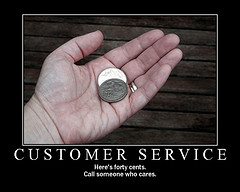Dumb Contact
This week I listened to an interesting podcast on the customer service experience from the User Experience Podcast site. The specific interview I am referring to is about half way down the page and is numbered '42' and called- 'The bizarre myth of customer service: an interview with David Jaffe'.
A link to the full 27 minute long interview is here.
David Jaffe is a consultant and author on customer service topics, most notably the co-author of a title called 'The Best Service is No Service', written with the former chief of customer service at Amazon.com.
I have not read the book, but in the podcast Jaffe makes some salient points about the typical problems in many large organizations customer service efforts - using the wrong metrics, not extracting competitive intelligence from customer service interactions, not empowering customer service agents to really solve problems. Many of these problems in the customer service office could also be applied to the service efforts that HR organizations provide as well, but in particular three principles that Jaffe identifies in the podcast really resonated in light of some recent work I have been involved with.
Eliminating dumb contact
'Dumb' contact are those emails, calls, or queries that service agents have to respond to that really should be 'self-solved', from either easy to find content on a intranet, from asking a colleague, or by posting a question to an internal forum or other tool to foster crowd-based customer support. These 'dumb contact' interactions, while singularly not very time consuming, accumulate over time, and as the organization scales become a drag and draw on overall ability to support more complex and significant issues. HR - how many times do you feel like you are answering the same questions, over and over?
The policy shield
Customer service agents often have official company policies around product returns, refunds, discounts, etc., that can end up becoming a kind of 'shield' they use to hide behind. Who hasn't heard a customer service agent state, 'I am sorry but I am not allowed to help you, our policy says blah, blah, blah'. Agents can then hide safely behind the shield until the customer gives up or goes away. HR organizations operate under the same policy restraints certainly, and while many policies in HR are truly 'must follows', perhaps involving legal or compliance issues, the larger majority are self-imposed. Making it too easy to hide behind policy shields in the customer service environment often leads to more frustrated customers, that see you as inflexible, unfeeling, and simply not easy to do business with. And it also frustrates the front line responders, who are not fully empowered to support customers and solve problems.
Extracting Intelligence
Often in customer service interactions, insight and intelligence into customer behaviors, competitive actions, and overall satisfaction with the products/services and company itself can be gleaned. But the problem is that by focusing almost solely on classic service metrics (call answer time, issue closing, repeat calls), the service organization does not really focus on collecting this intelligence. Since the agents and supervisors are not measured on collecting and sharing this insight, it often goes uncaptured. I think the same thing is true in HR, we survey the entire employee population annually, and often review and take action on those results (hopefully), but likely don't do anything with the intelligence that can be extracted from the typical volume of calls and emails to the HR service center. What are employees asking about? What programs or activities are generating confusion, interest, or concern? What are the Top 10 most informative comments that employees made this month?
There are many more interesting points in the podcast about improving customer service in organizations, and for me, lots of cross-application to the HR function, at least the component of the function that is essentially in direct customer service.
Have a listen and better still, let me know where else HR can learn from great customer service organizations.

 Steve
Steve
Reader Comments (2)
We noticed that you are not at the top of the search engines for a number of your key terms. We have helped companies similar to yours to achieve top organic rankings. Please reply to this message and we will prepare a special proposal for you, to show you how we can achieve similar results for you.
I didn’t even notice how much time had passed while erome watching this. That’s always the sign of a good video.